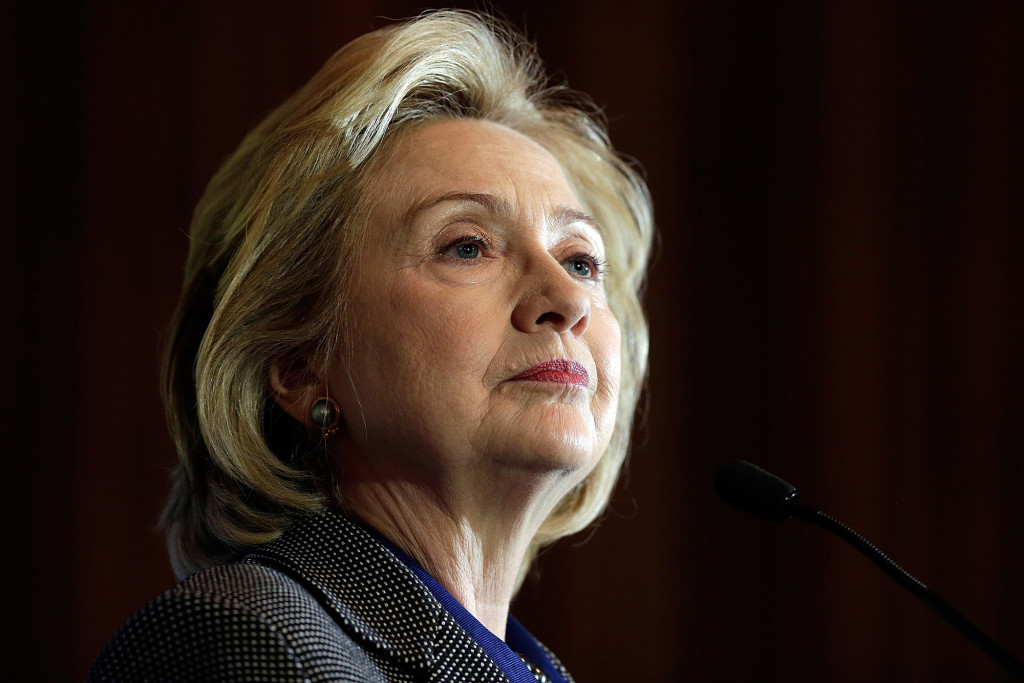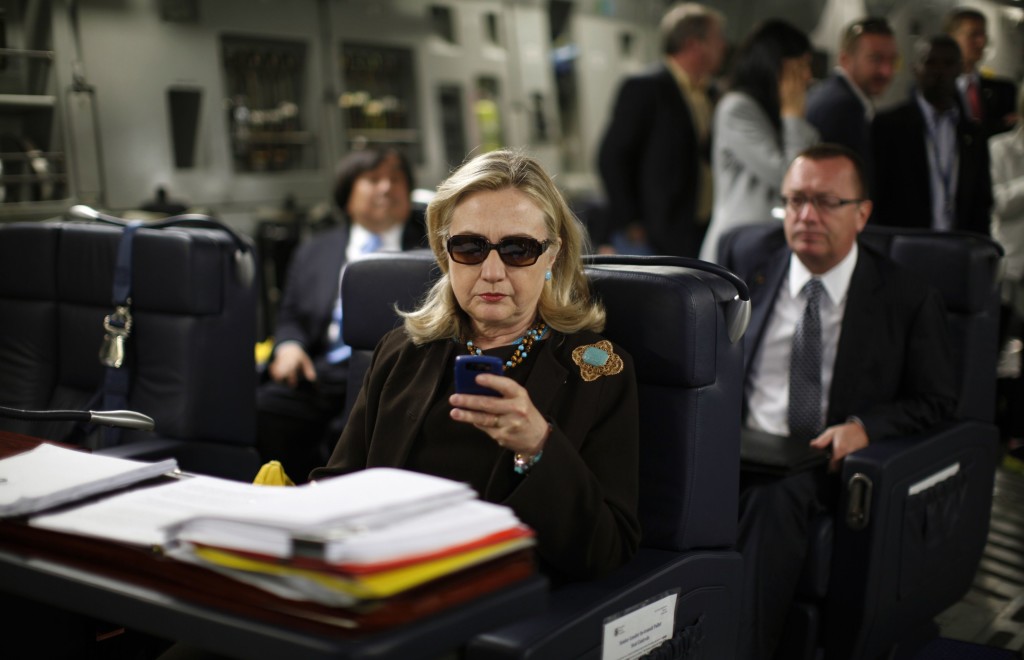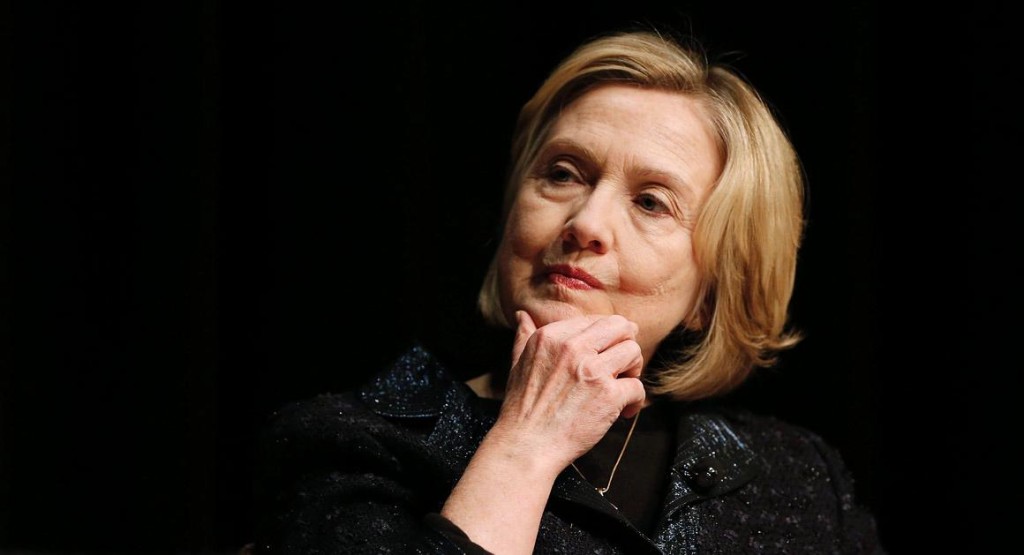Hillary Clinton private account targeted in Russia-linked email scam

Russia-linked hackers tried at least five times to trick Hillary Rodham Clinton into infecting her computer systems while she was secretary of state, newly released emails show. It is unclear whether she was fooled into clicking any attachments to expose her account. Clinton received the virus-riddled emails, disguised as speeding tickets from New York, over four hours early on the morning of Aug. 3, 2011. The emails instructed recipients to print the attached tickets – and opening them would have allowed hackers to take over control of a victim’s computer. Security researchers who analyzed the malicious software in September 2011 said that infected computers would transmit information from victims to at least three server computers overseas, including one in Russia. That doesn’t necessarily mean Russian intelligence or citizens were responsible. Nick Merrill, a spokesman for Clinton’s Democratic presidential campaign, said: “We have no evidence to suggest she replied to this email or that she opened the attachment. As we have said before, there is no evidence that the system was ever breached. All these emails show is that, like millions of other Americans, she received spam.” Practically every Internet user is inundated with spam or virus-riddled messages daily. But these messages show hackers had Clinton’s email address, which was not public, and sent her a fake traffic ticket from New York state, where she lives. Most commercial antivirus software at the time would have detected the software and blocked it. The phishing attempts highlight the risk of Clinton’s unsecure email being pried open by foreign intelligence agencies, even if others also received the virus concealed as a speeding ticket from Chatham, New York. The email misspelled the name of the city, came from a supposed New York City government account and contained a “Ticket.zip” file that would have been a red flag. Clinton has faced increasing questions over whether her unusual email setup amounted to a proper form of secrecy protection and records retention. The emails themselves – many redacted heavily before public release – have provided no shocking disclosures thus far and Clinton has insisted the server was secure. During Clinton’s tenure, the State Department and other U.S. government agencies faced their own series of hacking attacks. U.S. counterterrorism officials have linked them to China and Russia. But the government has a large staff of information technology experts, whereas Clinton has yet to provide any information on who maintained her server and how well it was secured. Republican presidential candidate Marco Rubio told Fox News Channel on Wednesday, “The exposure of sensitive information to foreign intelligence agencies by communicating in an insecure manner is incompetent, it is malpractice, it’s inexcusable.” The emails released Wednesday also show a Clinton confidant urging her boss and others in June 2011 not to “telegraph” how often senior officials at the State Department relied on their private email accounts to do government business because it could inspire hackers to steal information. The discussion never mentioned Clinton’s own usage of a private email account and server. The exchange begins with policy chief Anne-Marie Slaughter lamenting that the State Department’s technology is “so antiquated that NO ONE uses a State-issued laptop and even high officials routinely end up using their home email accounts to be able to get their work done quickly and effectively.” She said more funds were needed and that an opinion piece might make the point to legislators. Clinton said the idea “makes good sense,” but her chief of staff, Cheryl Mills, disagreed: “As someone who attempted to be hacked (yes I was one), I am not sure we want to telegraph how much folks do or don’t do off state mail b/c it may encourage others who are out there.” The hacking attempts were included in the 6,300 pages the State Department released, covering a period when U.S. forces killed Osama bin Laden and the Arab Spring rocked American diplomacy. New York State police warned as early as July 2011 about emails containing warnings of traffic tickets that actually contained computer viruses. Clinton received five copies between 1:44 am and 5:26 am on Aug. 3, 2011. They appeared to come from “New York State — Department of Motor Vehicles,” warning that a car registered to Clinton was caught speeding “over 55 zone” on July 5. Clinton had no public events in Washington that day, following the July 4 holiday. The email instructed the recipient to “print out the enclosed ticker and send it to town court, Chatam Hall, PO Box 117.” The former first lady and New York senator had maintained that nothing was classified in her correspondence, but the intelligence community has identified messages containing “top secret” information. Clinton had insisted that all of her work emails were being reviewed by the State Department, but Pentagon officials recently discovered a new chain of messages between Clinton and then-Gen. David Petraeus dating to her first days in office that she did not send to the State Department. As part of Wednesday’s release, officials upgraded the classification level of portions of 215 emails, State Department spokesman John Kirby said. Almost all were “confidential,” the lowest level of classification. Three emails were declared “secret,” a mid-tier level for information that could still cause serious damage to national security, if made public. “The information we upgraded today was not marked classified at the time the emails were sent,” Kirby stressed. Republished with permission of The Associated Press.
NSA Director: Hillary Clinton private email server open to spying

National Security Agency Director Mike Rogers says a foreign official who used a private email server to communicate would present a spying opportunity for the U.S. Rogers told senators at a hearing Thursday that he didn’t want to get dragged into the Hillary Clinton email controversy. But he acknowledged to Arkansas Republican Tom Cotton that the communications of senior U.S. officials are highly sought after by foreign intelligence agencies. Rogers says that if he learned that a top foreign official was emailing over a private server, he would consider that an intelligence-gathering opportunity. Clinton has said she is sorry she used a private email server as her exclusive email account for government business when she was secretary of state, but the issue has continued to shadow her presidential campaign. Republished with permission of the Associated Press.
Hillary Clinton campaign seeks to calm supporters about emails

Hillary Rodham Clinton‘s campaign is assuring supporters that the Democratic presidential candidate did not send any classified materials over her personal email server. Clinton campaign communications director Jen Palmieri says Clinton is not facing a criminal investigation and remains “committed to cooperating” with federal inquiries into her private account. In a message sent to campaign backers on Wednesday, Palmieri says many of the Republican presidential candidates also used private email address for work and several former secretaries of state used personal accounts. The response comes a day after Clinton turned her personal server over to the FBI for investigation. Federal investigators have begun looking into the security of Clinton’s email setup after the inspector general of the U.S. intelligence agencies said that classified information may have passed through the system. THIS IS A BREAKING NEWS UPDATE. Check back soon for further information. AP’s earlier story is below. Hillary Rodham Clinton’s presidential campaign casts her decision to turn over her personal email server to the Justice Department as cooperating with investigators. Her Republican critics suggest that the move and new revelations about classified information points to her malfeasance as secretary of state. Two emails that traversed Clinton’s personal system contained information that had been designated “top secret” and “Sensitive Compartmented Information,” one of the government’s highest classification ratings, U.S. officials said. Federal investigators have begun looking into the security of Clinton’s email setup after the inspector general of the U.S. intelligence agencies said that classified information may have passed through the system. There is no evidence she used encryption to prevent prying eyes from accessing the emails or her personal server. “It’s about time,” House Speaker John Boehner said in a statement after the front-runner for the Democratic nomination announced that she was directing that the server be relinquished. “Secretary Clinton’s previous statements that she possessed no classified information were patently untrue. Her mishandling of classified information must be fully investigated.” Republican National Committee Chairman Reince Priebus said: “All this means is that Hillary Clinton, in the face of FBI scrutiny, has decided she has run out of options. She knows she did something wrong and has run out of ways to cover it up.” For months Clinton refused calls to give up the home-brew email server she used in her suburban New York City home to send and store email through a private account. She has defended her use of the server, saying she used it as a matter of convenience to limit the number of electronic devices she had to carry. She has said the server account never held classified information. Officials are investigating whether classified information was improperly sent, though it’s not clear if the device will yield any information. Her attorney said in March that no emails from the main personal address she used while secretary of state are on the server or back-up systems associated with it. Clinton campaign spokesman Nick Merrill said Tuesday that she has “pledged to cooperate with the government’s security inquiry, and if there are more questions, we will continue to address them.” In March, Clinton said she exchanged about 60,000 emails in her four years in the Obama administration, about half of which were personal and were discarded. She turned over the other half to the State Department last December. The department is reviewing those emails and has begun the process of releasing them to the public. On Tuesday, Clinton attorney David Kendall gave to the Justice Department three thumb drives containing copies of work-related emails sent to and from her personal email addresses via her private server. Kendall gave the thumb drives, containing copies of roughly 30,000 emails, to the FBI after the agency determined he could not remain in possession of the classified information contained in some of the emails, according to a U.S. official briefed on the matter who was not authorized to speak publicly. The State Department previously had said it was comfortable with Kendall keeping the emails at his Washington law office. Also Tuesday, Republican Sen. Chuck Grassley of Iowa said two emails that traversed Clinton’s personal system were deemed “Top Secret, Sensitive Compartmented Information” – a rating that is among the government’s highest classifications. Grassley said the inspector general of the nation’s intelligence community had reported the new details about the higher classification to Congress on Tuesday. Those two emails were among four that had previously been determined by the inspector general of the intelligence community to have been classified at the time they were sent. The State Department disputes that the emails were classified at that time. “Department employees circulated these emails on unclassified systems in 2009 and 2011 and ultimately some were forwarded to Secretary Clinton,” said State Department spokesman John Kirby. “They were not marked as classified.” The inspector general for the intelligence community had told Congress that potentially hundreds of emails containing classified information are among the cache that Clinton provided to the State Department. Earlier this week, Clinton said in a sworn statement submitted to a federal judge that she has turned over to the State Department all emails from the server “that were or potentially were federal records.” The statement, which carries her signature and was signed under penalty of perjury, echoed months of Clinton’s past public statements about the matter. Republished with permission of the Associated Press.


